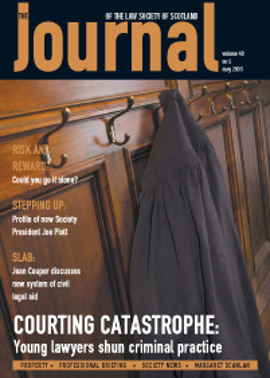Europe
Criminal law
Greek initiative on the application of the double jeopardy principle
In March, the Greek Presidency of the European Union brought forward a draft proposal on the application of the double jeopardy principle (non bis in idem) whereby no-one shall be prosecuted twice for the same acts and the same criminal behaviour. The proposal seeks to clarify under which circumstances a suspect can be retried for a criminal offence in another Member State. These circumstances include new facts or circumstances or a fundamental error in the previous procedure. The draft Framework Decision also deals with lis pendens (pending cases) and the question of jurisdiction when a case is brought in respect of the same criminal offence in another Member State. The proposal has been forwarded to the European Parliament under the consultation procedure. The Council of Ministers will be debating this proposal over the coming months and the European Commission is shortly due to bring forward its own Communication on the operation of the double jeopardy principle.
Competition policy and the professions
Brussels to probe professional regulations
European competition Commissioner Mario Monti has announced the Commission’s intention to scrutinise the rules and regulations applying to liberal professionals, such as lawyers, from a competition law standpoint. The announcement followed the conclusion of a Report on Regulation by the Competition Directorate General (http://europa.eu.int/comm/competition/publications/publications/#PORTS). In a speech addressed to German lawyers, Mr Monti said the Report highlighted different degrees of professional regulation between Member States. According to the findings of the Report, countries with less regulation had a higher number of service providers generating more turnover within the profession as a whole. The Commission has interpreted this to mean that less regulation could be a spur to wealth creation. As a follow-up to the Report, the Commission has launched a consultation paper, asking service providers and consumers whether existing rules, including those on advertising and the permissible types of practitioners’ organisations (which would include the ban on MDPs) hinder effective competition within the profession (http://www.europa.eu.int/comm/competition/general_info/invitation/en.pdf). The deadline for responses is 31 May. The Commission aims, by the end of the year, to have identified those existing rules and regulations that are “disproportionate and unjustified”. Meanwhile, a Report into the professions in Ireland commissioned by the Irish Competition Authority has concluded that certain rules governing legal practice, including entry requirements, reservation of work and the ban on MDPs may need to be relaxed (http://www.tca.ie/professions.html).
Company Law
Economists and lawyers battle to take over Directive
The latest round in the Take-over Directive debate could be seen to have pitted lawyers against economists in the European Parliament. Although the Legal Affairs Committee (JURI) is usually responsible for matters of company law, the economic significance of the Take-over Directive has led to the Parliament’s Economic and Monetary Affairs Committee (EMAC) being given extra rights of examination. Divisions have emerged between the two committees on some key provisions, notably Multiple Voting Rights (MVRs). MVRs, which allow a shareholder a higher number of votes per share, are seen by some as a barrier to take-overs and the free movement of capital. Mr Lehne MEP (the Rapporteur for JURI) favours the gradual abolition of all such rights, preferably by 2010. Mr Huhne MEP (draftsman of the EMAC opinion) proposes prohibiting only new MVRs, in order to avoid compensation claims from dispossessed shareholders. The Chair of JURI, Mr Gargani MEP, will ultimately decide which committee has competence over each provision in the Directive. Parliament is scheduled to vote on the Report at the plenary session in July, although this may be delayed until September.
Employment law
Can employers contract out of equal pay requirement?
An Advocate General has ruled that there are situations where salary differentials between male and female colleagues doing comparable work are not caught by the equal pay requirement (Case C-256/01) (http://www.curia.eu.int). The case involves a claim by a female lecturer at a college in England. The college had contracted her services through an employment agency, which also paid her salary. She argued that she earned less than male colleagues who were employed directly by the college and challenged a denial of access to an occupational pension scheme. Advocate General Geelhoed, however, said that one single entity had to be responsible for remunerating the employees and removing any gender-based inequality in pay in order for the equal pay principle to apply. Although this may give scope for employers to evade the equal pay requirement, that was a problem for future legislation to correct. Mr Geelhoed accepted though that a sectoral pension scheme, administered externally, which admitted only regular employees may be indirectly discriminatory if this requirement excluded significantly more women than men. The Advocate General’s opinion does not bind the Judges, who will now deliberate before giving the final decision of the Court.
In this issue
- Scotland's courts face lost generation catastrophe
- Compromise is better option to confrontation
- Date set for reform package
- Risk and reward await those who go on their own
- A matter of opinion
- Organise workload to make your valuable time count
- Continuity planning takes drama out of a crisis
- Pursuers panel advises on professional negligence
- Client relations
- Platt aiming to push forward
- President's column
- Abandonment at common law still competent
- Holiday heaven or hell?
- Data Protection Act 1998 - what you need to know
- Getting to grips with debt
- Europe
- How the leopard changed its spots
- Licensing
- Scottish Solicitors' Discipline Tribunal
- Scottish Solicitors' Discipline Tribunal (1)
- Scottish Solicitors' Discipline Tribunal (2)
- Website reviews
- Book reviews
- Contaminated land must be discussed with clients
- Property reports service now online






